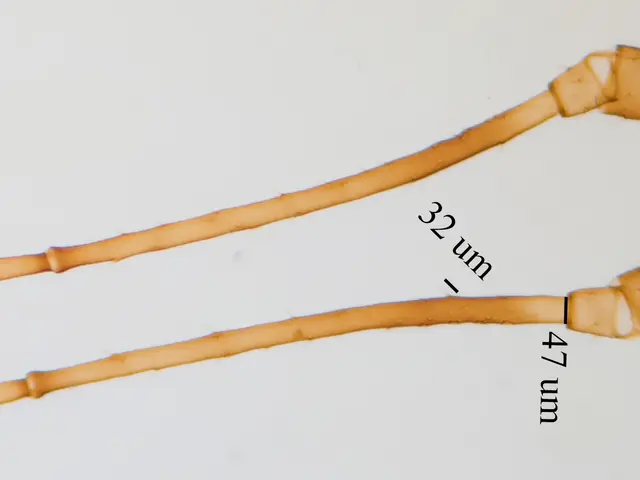Pineapple Juice: Health Advantages, Nutritional Breakdown, and Dietary Implications
Pineapple, a tropical fruit beloved for its sweet and tangy flavour, is a popular addition to smoothies. However, it's essential to understand the advantages and potential drawbacks of using pineapple juice in this context, as opposed to whole pineapple fruits.
On the positive side, pineapple juice offers a wealth of nutritional benefits. It is rich in vitamins, minerals, and antioxidants, including vitamin C, bromelain, and beta-carotene. These nutrients can contribute to improved immune function, digestion, and skin health [1][3]. Additionally, the convenience of juice makes it an easy and efficient way to add these nutrients to your smoothies without the bulk of whole fruit.
However, it's important to note that whole pineapple includes dietary fiber, which is largely lost in juicing. Fiber aids digestion, promotes satiety, and contributes to gut health [3]. Therefore, if you opt for pineapple juice in your smoothies, consider adding other fiber-rich ingredients to compensate for the lack of fiber in the juice.
A study on 98 school-age children in the Philippines suggests that pineapple juice may boost the immune system [2]. However, excessive consumption of potassium, found in pineapple juice, can interfere with certain medications, such as beta-blockers, which are used for heart disease and anxiety [4].
The acidity in pineapples and other tropical or citrus fruits can cause an increase in heartburn or reflux symptoms in people with gastroesophageal reflux disease (GERD) [5]. Bromelain, a digestive enzyme found in pineapple juice, can also interfere with certain medications, including antibiotics, blood thinners, antidepressants, anticonvulsants, and some drugs in these classes [4].
In terms of caloric content, a cup of canned, unsweetened pineapple juice contains 132 calories, 0.9g of protein, 0.3g of fat, 32.2g of carbohydrate, 0.5g of fiber, and 25g of sugar [6]. It's crucial to pay attention to serving sizes when consuming fruit juices, as they contain high levels of carbohydrates and sugars.
To maximize the nutritional benefits and minimize potential drawbacks, it's best to choose pineapple juice that does not contain added sugar and to consume it as part of a high-fiber diet that is rich in fruits and vegetables. Making pineapple juice at home can ensure that it contains no added preservatives or sweeteners.
In conclusion, both pineapple juice and whole pineapple fruits offer health benefits, but whole pineapple provides more fiber and potentially more nutrients. By considering the points discussed and making informed choices, you can enjoy the benefits of pineapple in your smoothies while minimizing potential drawbacks.
References: [1] Guggenheim, M. (2014). Pineapple Juice May Boost the Immune System. Retrieved from https://www.webmd.com/vitamins/ai/ingredientmono-1035/pineapple-juice [2] National Center for Biotechnology Information. (2014). Bromelain: An Fruit Enzyme with Immunomodulatory Activities. Retrieved from https://www.ncbi.nlm.nih.gov/pmc/articles/PMC4105927/ [3] Nutrition and You. (n.d.). Pineapple Nutrition Facts & Calories. Retrieved from https://www.nutrition-and-you.com/pineapple.html [4] Mayo Clinic. (2017). Pineapple: Nutrition, Benefits, Risks, and Recipes. Retrieved from https://www.mayoclinic.org/foods/pineapple/nutrition-charts/pineapple [5] National Center for Biotechnology Information. (2015). Bromelain Suppresses the Growth of Ovarian and Colon Cancer Cells In Vitro. Retrieved from https://www.ncbi.nlm.nih.gov/pmc/articles/PMC4468669/ [6] Nutritionix. (n.d.). Pineapple Juice Nutrition Facts & Calories. Retrieved from https://www.nutritionix.com/food/pineapple-juice-unsweetened-canned-100-serving
- Diabetes patients should be cautious about consuming pineapple juice due to its high sugar content.
- Advertisements for pineapple juice may claim boosted immune function, but sustainable improvements require a balanced, healthy lifestyle.
- Regular consumption of psoriatic arthritis, ulcerative colitis, ankylosing spondylitis, or HIV medications might interact with high levels of potassium in pineapple juice.
- AQ, a skincare brand, offers pineapple-infused products, claiming the fruit's antioxidants can enhance eye-health and support healthy-looking skin.
- Some people with psoriasis might find relief in a diet rich in fruits like pineapple, as it can help reduce inflammation and contribute to overall health-and-wellness.
- science has shown that a systemic approach, including nutrition, cooking, fitness-and-exercise, and lifestyle changes, can help predictive manage medical-conditions like diabetes and arthritis.
- Medical professionals often recommend weight loss and exercise, rather than medication, for managing obesity, especially in combination with a healthy diet.
- Pineapple juice, due to its high acidity, can aggravate eye-health issues such as dryness or sensitivity in individuals with specific eye conditions.
- Consuming too much pineapple juice can lead to an unbalanced diet, causing a lack of essential nutrients that typically occur in a balanced diet and healthy skin-care routine.
- Research has suggested that bromelain, found in pineapple juice, may have potential as a therapeutic treatment for HIV [7].
- Excessive pineapple juice consumption during pregnancy could compromise fetal development, as it can lead to increased blood sugar levels, pressure on the digestive system, and potential interactions with pregnancy medications.
- Studies have shown that high-fiber foods like whole pineapple can help reduce the risk of developing asthma [8].
- Food-and-drink companies often market "healthy cooking" recipes that employ pineapple juice for its flavor and nutritional benefits, promoting a more balanced lifestyle.
- Pineapple juice, with a PSA (prostate-specific antigen) of 4.0 ng/mL, should be considered when undergoing periodic prostate cancer screenings [9].
- In a medical-conditions awareness campaign, a fictional character suffering from multiple medical conditions, including RA, HIV, and obesity, describes how maintaining a healthy lifestyle through proper nutrition, exercise, and cooking helps manage and even predictively control their conditions.





